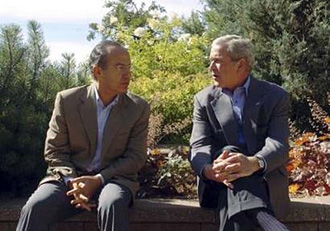 |
 |
 |
 News from Around the Americas | August 2007 News from Around the Americas | August 2007  
Bush Vows Anti-Drug Aid for Mexico
 Michael A. Fletcher - Washington Post Michael A. Fletcher - Washington Post
go to original


| | Mexico's President Felipe Calderon (L) and U.S. President George W. Bush chat in Montbello, Quebec August 21, 2007. (Reuters/Presidencia/Imperio Resendiz) |
Montebello, Canada - President Bush on Tuesday pledged to develop a robust aid package to help Mexico battle that country's murderous drug cartels, saying that the two neighbors must join forces to confront "a common problem," the illegal drug trade.

Speaking after a summit here with Mexican President Felipe Calderón and Canadian Prime Minister Stephen Harper, Bush said that he and Calderón had "a serious discussion" about what form the program might take but that negotiations remained at an interim stage.

He said it would not be like Plan Colombia, a massive U.S. aid program that gave the Colombian government Black Hawk helicopters, sensitive intelligence-gathering technology, military, police and intelligence training and other things to help push back Marxist guerrillas and eradicate drug crops.

Bush said that the program would entail no "U.S. armed presence" in Mexico. Instead, Calderón said, the focus would be on coordinating enforcement activities against drug gangs that operate on both sides of the U.S.-Mexico border. He is also seeking U.S. help with border surveillance targeting drug smugglers.

"We discussed a common strategy to deal with a common problem, which is narco-trafficking and violence on the border," Bush said.

The two-day summit, held here at a riverfront resort, focused on strengthening the already strong ties among the North American allies. During meetings that were compressed by a few hours to allow Calderón to return home early to survey damage done to his country by Hurricane Dean, the leaders also promised to continue work to lower some trade barriers, officials said.

The summit fed concern among Canadian politicians and activists that the three countries were slowly working toward forming a kind of North American union to increase the countries' economic clout and counter competition from rivals such as China and the European Union. This would allow business interests to erode national sovereignty, critics say.

One persistent rumor is that the three countries were secretly planning to build a superhighway through the U.S. heartland to connect Manitoba and Mexico.

The three leaders scoffed at that notion Tuesday, as they staunchly defended the increasing economic cooperation that has fostered $2.4 billion in daily trade among their countries.

Harper joked that he had even heard about "interplanetary" superhighways being planned by the three countries, while Bush said he was "amused by the speculation" that has surrounded the meetings, officially dubbed the Security and Prosperity Partnership of North America.

Turning serious, Bush said, "I believe it's in our interest to trade, I believe it's in our interest to dialogue, I believe it's in our interest to work out common problems for the good of our people."

He went on to defend the North American Free Trade Agreement, which came into force in 1994. He said it "has yielded prosperity" in the three countries even as it has generated political controversy.

Bush's endorsement of the agreement stands in contrast to the views of leading Democratic presidential candidates. Former North Carolina senator John Edwards and Sen. Barack Obama (Ill.) have both pledged to revise the agreement if elected president. Sen. Hillary Rodham Clinton (N.Y.) has said that the accord, which was signed during her husband's presidency, has not been implemented correctly, hurting U.S. workers.

In a joint statement released as the summit closed, the three leaders said that they had reached an accord on an emergency plan for battling an avian or pandemic flu outbreak. They also said that they crafted a framework to increase consumer product safety, while working toward harmonizing regulations and achieving more energy and science cooperation. | 
 | |
 |



